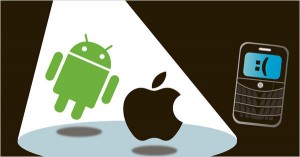Can BlackBerry Right the Ship?
 After weeks with an unreadable trackball that countless battery pulls couldn’t seem to fix, desperation set in. It was time to find a new smartphone. While my BlackBerry certainly exceeded its addictive reputation, a recent trip to the AT&T store shed new light on a brand that had once dominated the smartphone industry.
After weeks with an unreadable trackball that countless battery pulls couldn’t seem to fix, desperation set in. It was time to find a new smartphone. While my BlackBerry certainly exceeded its addictive reputation, a recent trip to the AT&T store shed new light on a brand that had once dominated the smartphone industry.
While the thought of parting with my BlackBerry seemed unfathomable at best, every AT&T store I visited had just one model available, the BlackBerry Torch. Although a disappointing trial run proved the phone lacked functionality, even more shocking was the brand’s decision to stray from its forte with a touch screen-slider.
Without an alternative, I turned to Apple’s iPhone.
How could a BlackBerry fanatic purchase a product from its biggest competitor? In the words of my AT&T salesperson, it was time to “get off the sinking ship.”
For BlackBerry maker Research In Motion (RIM), the company has struggled to keep pace with both an evolving smartphone industry as well as consumer demands. To put the explosive growth of the industry in perspective, Nielsen estimates that by the end of 2011 there will be more smartphones in the U.S. market than feature phones.
Despite its flaws, RIM’s Achilles’ heel has been its success with corporate consumers. While this demographic provided a loyal and profitable target base for the company to streamline the focus of its BlackBerry line, the smartphone industry has begun to shift. Thanks to lower costs and an endless variety of wireless carriers and product models, regular consumers are now the primary drivers of demand in this market.
Unfortunately for RIM, regular consumers have placed a greater emphasis on design and applications over functionality, and as a result, the BlackBerry line has struggled to resonate. Over the past several months, declining sales and consumer disconnect have also created rifts between executives over marketing strategy, leading to several high profile departures from the company.
No stranger to woes, RIM is now suffering on all fronts, particularly in terms of a meager product selection and low stock prices. Worth more than $80 billion three years ago, RIM is now worth less than $15 billion and the company’s shares have fallen to their lowest level in five years. At its peak in 2009, BlackBerry held nearly a 50% share of the North American smartphone market. Now the company is desperately trying to retain its 17% market share.
With the release of the highly anticipated BlackBerry Bold Touch 9900 this fall, it remains to be seen if RIM can right the ship. But for now, Apple and Android-based smartphone makers such as HTC will continue to surge ahead.
Is the end near for BlackBerry? While I’ll miss BlackBerry Messenger, I wasn’t willing to wait around and find out. ![]()
Kevin Anthony is an intern at CJP Communications
